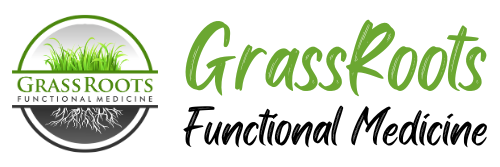Feeling a little backed up lately? You’re not alone!
Constipation is incredibly common, affecting about 16% of adults and 33% of those over 60. But just because it’s common doesn’t mean you should overlook it or pop a laxative and call it a day!
Your body was created as a highly efficient machine, designed to eliminate toxins and waste one to three times per day. If that’s not happening, it’s time to dig deeper and understand why your digestion isn’t optimal so you can fix the problem.
Here are 5 common causes of constipation and strategies to address them!
1. Vagal Nerve Dysfunction
Your vagus nerve is one of the most overlooked factors when it comes to gut health!
It’s the main component of your parasympathetic nervous system (your rest and digest response), and the main highway connecting your brain and your GI tract. If your vagal nerve isn’t firing properly or is disrupted, your gut health and microbiome will not function at full capacity.
This can cause constipation, an inability to release stomach acid or enzymes properly, difficulty knowing when you are hungry and full, and disruption to your neurotransmitters that affect mood and energy.
Signs of vagal nerve dysfunction include:
- Constipation
- Trouble drinking liquids or swallowing pills
- Difficulty speaking
- Erratic heart rate
- An inability to relax
Strategy: Vagal Nerve Exercises
Interestingly, stimulating your gag reflex is a great way to activate that vagus nerve. You can use a tongue depressor or even just your toothbrush to get a deep gag that will wake up your vagus nerve.
You can also take cold showers and gargle vigorously to the point that your eyes start tearing up and you’re producing saliva. Singing and meditating are two other helpful options.
However, these aren’t “one and done” exercises. Instead, think of them like lifting weights. If you go to the gym and do curls for two days you aren’t going to have monster biceps. Similarly, you aren’t going to fix vagal nerve issues with two days of gargling. You’ll want to do these exercises repeatedly over time.
2. Methane-Dominant SIBO
Small Intestinal Bacterial Overgrowth (SIBO) occurs when the bacteria in your small intestine become unbalanced and overgrow, disrupting the digestive process.
The excess bacteria feed off of and ferment the food in your small intestine, particularly sugar, carbohydrates, starches, and alcohol. This fermentation process produces a lot of gas, which is why the hallmark symptom of SIBO is bloating. However, it can also lead to constipation, diarrhea, food sensitivities, and nutrient deficiencies.
The type of gas produced plays a role in how else SIBO impacts digestive function. Studies show that methane-dominant SIBO typically leads to constipation, whereas hydrogen-dominant SIBO is more often associated with diarrhea.
Strategy: Get Tested & Treat with Herbal Supplements
The lactulose breath test is the gold standard for SIBO testing because it is the most accurate and it determines if your SIBO is hydrogen or methane dominant.
In my clinic, when a patient tests positive for SIBO we use a combination of two herbal supplements to help kill both bacterial and fungal overgrowth: SIBOcide and CandiCide. They contain a blend of herbs that attack the pathogens without compromising the good bacteria in other areas of your GI tract.
3. Low Stomach Acid
Stomach acid plays a very important role in proper digestion, helping you break down food. Without enough of it, food is left sitting in your GI tract undigested, instead of being expelled as waste.
Low stomach acid can also lead to SIBO as the undigested food creates a feeding frenzy for the bacteria in your small intestine.
Strategy: Try an HCL Supplement
HCL is your primary stomach acid, so if your constipation and other GI symptoms are due to a deficiency, you can alleviate them with an HCL supplement.
4. Dehydration
Sometimes you just need more water to keep things moving along!
Your colon’s main job is to absorb water to create stool and eliminate it. Without enough water, stool remains in the colon for too long and becomes harder and more difficult to pass.
Strategy: Drink half of your body weight in ounces of water per day
To keep the pipes running smoothly, take your weight in pounds, divide it by two, and aim to drink that many ounces of water per day. Just make sure it’s filtered.
5. Not Eating Enough Fiber & Resistant Starches
Finally, your constipation may be caused by dietary factors. Fiber travels relatively intact through your digestive tract, absorbing water to add bulk to stool and help move waste along.
Similarly, resistant starches (those that are resistant to digestion) pass through your digestive system mostly unchanged until they reach your large intestine. There, they are broken down into short-chain fatty acids. The most important of these is butyrate, which fuels the cells that line your colon. This helps promote optimal digestion and feeds healthy gut flora.
If you’re not consuming enough of these, your whole system can get backed up.
Strategy: Consume More Fiber & Resistant Starches
To combat dietary-related constipation, eat plenty of foods rich in soluble fiber and resistant starches, including leafy greens, broccoli, sweet potatoes, green bananas, citrus fruits, carrots, and apples.
Remember, constipation does not happen in isolation or out of the blue! There’s always a reason and it’s often a sign of a larger, underlying problem.
Instead of ignoring it or relying on over-the-counter medications for short-term relief, it’s worth it to do a little digging and actually fix the issue!
About the Author: Dr. Seth Osgood is a Doctor of Nursing Practice, Board Certified Family Nurse Practitioner and Institute of Functional Medicine (IFM) Certified Practitioner. Dr. Osgood received his post-graduate training in Functional Medicine through the IFM and from working with Dr. Amy Myers. He has helped people from around the world improve their health utilizing a Functional Medicine approach.
Want to work with Dr. Osgood and the GrassRoots team? Become a patient in our West Lebanon, New Hampshire Functional Medicine clinic, our Burlington, Vermont Functional Medicine clinic, or our Austin, Texas Functional Medicine clinic!





0 Comments